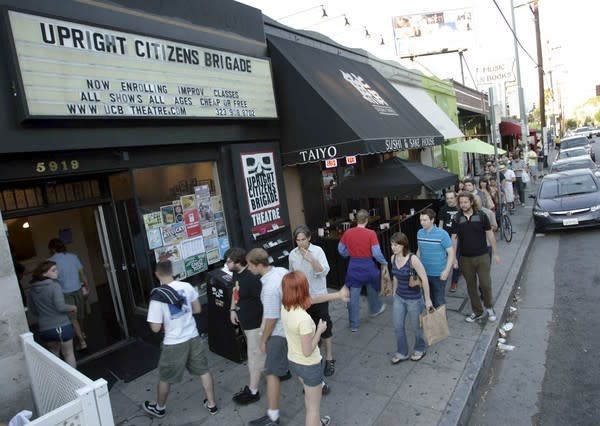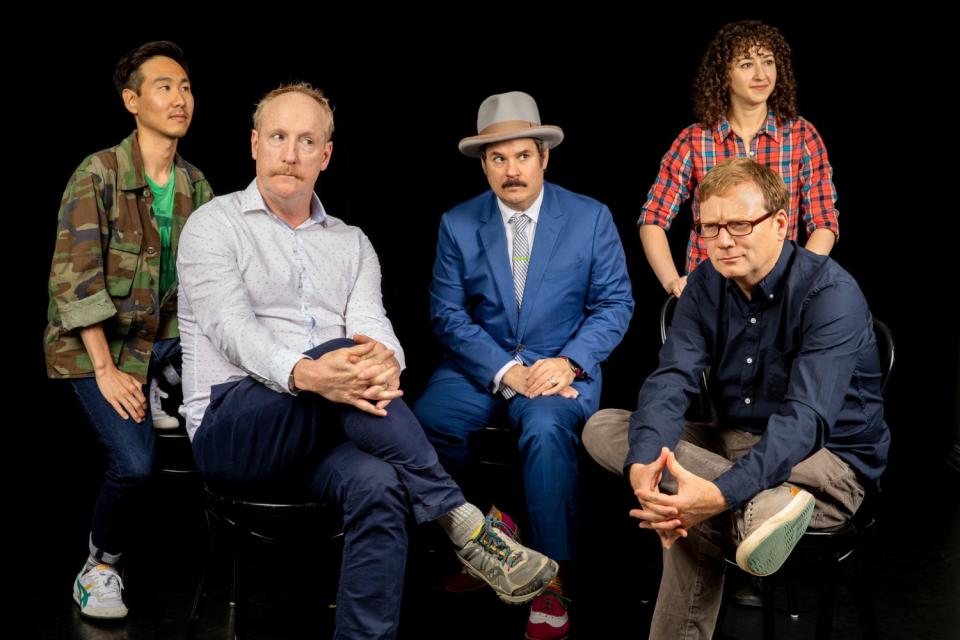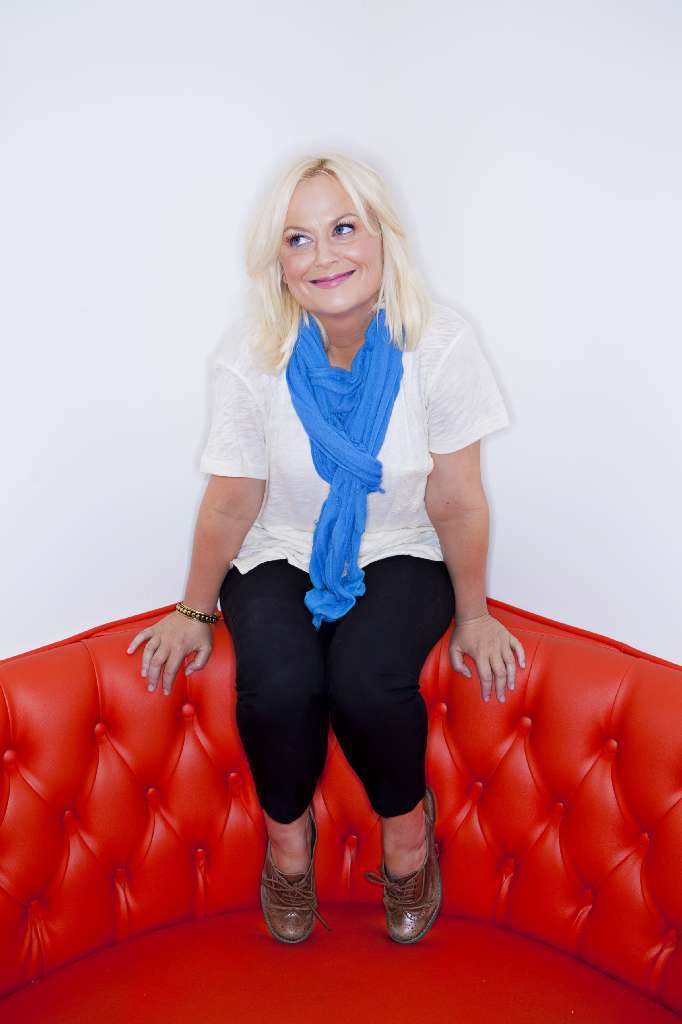How this L.A. comedy theater botched coronavirus layoffs

Amid the coronavirus pandemic, comedy theaters are among the many businesses shutting their doors and laying off staff. Some are doing it more gracefully than others.
On the first day of a “Level 101” improv class at the Upright Citizens Brigade, many students learn a UCB tradition, literally touching each other's back and saying, “I've got your back.” But when UCB suddenly laid off dozens of staff members March 17 via email, many former employees, students and teachers felt that the bicoastal institution did not have their backs.
A copy of the email obtained by The Times, sent by UCB Chief Financial Officer Daryl LaFountain, reads: “Sadly, we regret to inform you that we have decided to conduct mass layoffs. This decision was not an easy one and the Company reviewed all options…” Following some pro forma HR information, including a notice that confidentiality restrictions were still in force, there is a final expression of “heartfelt regret that we had to go down this path.”
The frustration of UCB staffers interviewed for this story, some of whom requested anonymity, is about more than just a muddled response to an unforeseen global disaster. Many members of the community have their doubts that the 20-year-old network of theaters and schools can come back from not only the financial hit of the crisis but also a lack of trust in the leadership — a disconnect that is years in the making.

Within a decade of its founding, UCB became the nation’s first accredited improv comedy school. There followed a period of untrammeled growth until, in late 2018, leaders announced they were suddenly in a deep deficit. The next year saw the closing of one New York theater, management layoffs and a growing movement of performers demanding pay and transparency. LaFountain, hired in the fall, slowly began stabilizing the finances. Then came the coronavirus.
As in the past, most of the blame has fallen on the four founder-owners of the institution, collectively known as the UCB 4 — Matt Besser, Amy Poehler, Ian Roberts and Matt Walsh. Through a spokesperson, the founders, as well as LaFountain, declined to comment for this story. (This reporter has paid for classes at UCB, hosted a TV pilot with Walsh, and had Walsh and Besser as guests on his own comedy shows.)
In response to a request for comment, the spokesperson said that the UCB 4 have made phone calls and mailed letters to laid-off workers. As of Monday afternoon, nearly a week after the layoffs were announced, those letters were just beginning to trickle into former employees’ mailboxes. Bearing the names of the founders but no signature or date, the letter begins, “Let us first start by saying we are sorry for the delay in hearing from us directly.” The UCB 4 explain that it took 48 hours to “personally reach out” to employees first. (Only one of five staff members interviewed received such notice.) They add that almost no revenue is coming in, that “there is no playbook for this” and “the last thing we want to do is add to anyone’s hardship during this time.”
Layoffs everywhere
“Their first move in a financial crisis is to do mass layoffs?” asked one laid-off UCB employee who requested anonymity. But other comedy theaters, dealing with their own sudden loss of income, weren’t shocked.
Curious Comedy Theater in Portland, Ore., laid off all six of its full-time staff and 18 part-time workers. “UCB laying off staff is not a surprise to me,” said Curious Comedy's managing/artistic director Stacey Hallal. She was dismayed, however, that they either couldn’t or wouldn’t continue employment through the three months it might take for businesses to open again.
“I, personally, would have liked to have paid my staff throughout the next three months if I could have,” she said. “Many of us believe that UCB has the capacity to do that considering the UCB 4's success individually and as an organization. But we don't really know what they have the capacity to do.”
New York's Magnet Theater, owned by Sean Taylor and Armando Diaz, laid off 45 employees, many of them part-time. “I know there's been a lot of criticism of UCB,” said Diaz, who had been UCB’s first teacher. “But in the end, it's theater, and theater is a small business. I think it's pretty unfair. Most of us are just improvisers, we didn't go to business school. We're just trying to teach people and make their lives better.”
A senior manager at another Los Angeles comedy theater, who also requested anonymity, said they had paid out everyone for completed work, kept salaried personnel as long as possible and informed staff and teachers about government programs that can assist them. “I've been pursuing small-business loans, seeking insurance claims, and having conversations with the landlord about rent abatement,” the manager said.
If the UCB is taking any such action, it hasn’t been shared with employees. “UCB is the big dog on the block,” said the theater manager, “and they're going to a take a lot of heat for this — and it's deserved. It was terrible messaging on their part.”
Lou Gonzalez, who until last week taught at UCB for four years, found out about the theater closing through friends. “People were told things one day and a different thing the next,” he said. “Someone was told they were assured a job and then got the email for a layoff. A lot of people have worked here a long time. It doesn't pay a lot, but we work here because we want to pay it forward and the theater has given us opportunities.”
Gonzalez has read the new letter but hasn’t yet received it himself. “This can easily be read as a reaction to their poor response,” he said. “This is very similar to their response to the previous firings and theater closing.… I’ve gotten more notices and feedback from a spin class I took in Atlanta than I have from the place I’ve spent 10 years giving my energy and time. A letter is not going to fix how they handled this.”
I’ve gotten more notices from a spin class I took in Atlanta than I have from the place I’ve spent 10 years.
UCB teacher Lou Gonzalez
Adam Conover, best known as host of TruTV's “Adam Ruins Everything,” has been a vocal critic of UCB’s response. A regular UCB performer since 2005, Conover taught sketch comedy for three years at the school in New York.
“Times are tough, but it's hard for me to see this as anything other than a profoundly callous way to treat the most devoted members of our community,” Conover said on Twitter. “Those in charge could have used their resources to cushion the blow and offer support to those who have given so many years of their lives to UCB. They still can.”
In a phone interview, Conover added: “The UCB founders have said for 15 years that it's not a corporation, it's a community — a commune, they've said. And with performers performing for free and [volunteering] for shows that are no longer cheap … I felt it was a community, and we care about comedy and we care about each other. So in this circumstance, when there's a pandemic ... I feel that falls below the standard of a community.”
A question of survival
One of those laid off was UCB’s New York artistic director, Michael Hartney. He had received a personal call from Besser, and wasn’t angry, but “a little more sad and worried. I think it's more about the survival of theater than my livelihood.”
He was satisfied with the call, but “I wish I could say the same for a lot of my coworkers who were notified through this email, which wasn't particularly well written or kindly written. I also think the UCB 4 are in a precarious position right now and are doing their best to get us in a place where we'll be able to survive this. If they could have offered a severance and have the company survive, they would have.”
On March 17, former employees set up two GoFundMe fundraising pages for affected workers — one for New York and one for Los Angeles. As of Monday evening, each had raised about $54,000.
“I figured we wouldn't be coming in, but didn't think we'd get laid off,” said Paris Adkins, the employee who started the New York page. She said about 40 employees were laid off there. Because of the GoFundMe, “we currently have enough to cover all salaries or earnings for a month.”
Adkins' GoFundMe inspired Peter Byrnes to start a West Coast version. A UCB performer who was laid off from his barista job at UCB's Inner Sanctum Cafe on Sunset Boulevard, Byrnes found out about his layoff from the mass email. In seeking to distribute the funds, Byrnes has tried and failed to obtain a complete list of those laid off.
“I was told I couldn't get it,” said Byrnes. “I have to figure it out in a grass-roots way. I have a Facebook group and a Google spreadsheet that people can add, open-source. We've got teachers, facilities, maintenance staff and we're trying to get security guys too.”
For Byrnes, it was another example of inadequate care. “They should be doing more,” he said, “especially people who've been there 10 years or more. It seems this is the move they had to make, but it could have been made in a way more respectful of everyone.”
Neither Byrnes nor Adkins could say whether the UCB 4 had contributed to the fundraisers, but their names did not show up on the donor pages. Chicago's Second City theater, meanwhile, matched $25,000 in donations to a GoFundMe for its nighttime staff.

Yet for some, the UCB is the theater with the greatest obligation among comedy institutions. “I think they're the largest school, the largest theater, in New York and L.A.,” said Billy Merritt, a longtime UCB teacher and performer, who had to pause two UCB classes he was leading. “When I first started, they were the smallest.”
Then came the years of growth. “The problems came from saying 'yes and' to everything and you can't do that to everything,” said Merritt. He mentioned the fun but money-losing Del Close Marathon, an improv festival produced by UCB. There were also missteps in establishing second theaters in New York and L.A. “Real business people need to run the business. But the people I know are good people and aren't in it for themselves.”
Yet in this case, what critics have been asking for isn’t so much an intricate business plan as a more humane approach. “It's not a normal business,” said Hallal of Curious Comedy. “And yet, communication is also at the heart of improvisation. I do believe we need to practice what we teach.”
No matter what their criticisms, no one interviewed for this story expressed a desire for UCB to fail.
“I really do hope that they get things together,” said Gonzalez. At the same time, “I don't know if I want to move forward there.”
“I hope that we resume operations,” Hartney said, “but I don't know what the reality is. And now that I'm not involved in the day-to-day, I don't know what's happening. I am hopeful that the UCB theater will survive. But I am certain that the UCB community will survive.”
Late Monday evening, UCB released the mailed letter in an email to the wider community, adding that Poehler was going to fund a one-month extension to all laid-off employees’ health benefits. The note concluded: “We hope to see you all on stage in the near future.”

